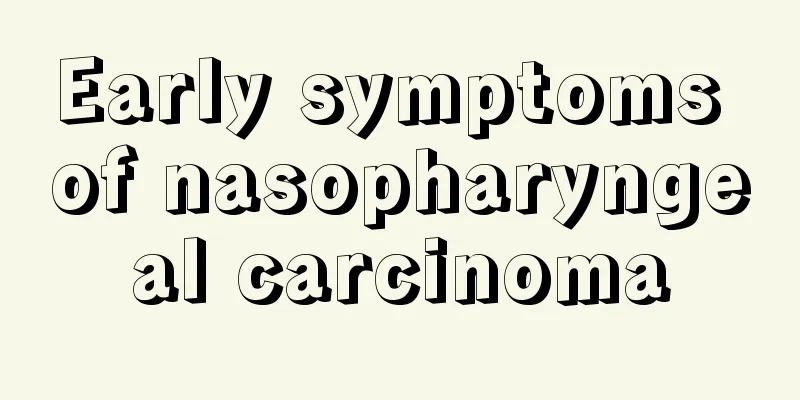Early symptoms of nasopharyngeal carcinoma

|
Nasopharyngeal carcinoma is a malignant tumor that occurs in the nasopharynx. Its early symptoms may not be obvious and are easily overlooked. However, early detection and treatment are crucial to improving cure rates and quality of life. Early symptoms include respiration of blood in the nose, tinnitus, hearing loss and a feeling of blockage in the ear, headache, numbness of the facial skin, nasal congestion, etc. It is recommended to seek medical attention in a timely manner and take appropriate measures under the guidance of a doctor. The details are as follows: 1. Respiratory hematuria: Patients with early nasopharyngeal carcinoma may experience respiratory hematuria, which is manifested as blood in sputum after nasal suction or blood in snot after blowing the nose. The amount of blood is small and sometimes there is no blood. For this symptom, the main treatment method is surgical removal of the tumor, combined with radiotherapy or chemotherapy for comprehensive treatment. 2. Tinnitus, hearing loss, and a feeling of blockage in the ear: When nasopharyngeal cancer occurs on the lateral wall of the nasopharynx or the upper lip of the Eustachian tube opening, it may compress the Eustachian tube, leading to unilateral tinnitus, hearing loss, and a feeling of blockage in the ear. In addition to surgical removal of the tumor, auxiliary measures such as drug therapy, radiotherapy, or wearing hearing aids can be used to treat symptoms of tinnitus and hearing loss. 3. Headache: Headache is one of the common early symptoms of nasopharyngeal carcinoma. It can be the first symptom or the only symptom. The location of the headache is not fixed and it is mostly intermittent. For headache symptoms, painkillers are mainly used for treatment, combined with surgery, radiotherapy or chemotherapy to control tumor growth. 4. Facial numbness: When nasopharyngeal carcinoma invades the cavernous sinus, it may cause numbness in the facial skin. Clinical examination shows that pain and touch are reduced or absent. Surgical removal of the tumor is the main treatment. For facial numbness symptoms, auxiliary treatment methods such as nerve nutrition drugs or acupuncture can be used. 5. Nasal congestion: The tumor blocking the posterior nostril may cause nasal congestion, affecting the patient's breathing and daily life. Surgical removal of the tumor is the key to relieving nasal congestion symptoms, and radiotherapy or chemotherapy can be combined to reduce the size of the tumor. Other symptoms may also appear in the early stage of nasopharyngeal carcinoma, such as swollen lymph nodes in the neck, double vision, etc. A good attitude and living habits should be maintained to lay a solid foundation for successful treatment. |
<<: Early manifestations of rectal cancer in women
>>: How much cervical cancer vaccine should I get at the age of 35
Recommend
What should we pay attention to when we have spinal diseases?
Many of our friends suffer from spinal diseases i...
Routine care for patients with pituitary tumors
For diseases such as pituitary tumors, surgical t...
Will I get bladder cancer if my bladder has been traumatized?
The bladder is an organ that stores urine. It is ...
Treatment for chronic foot ulcers
People often have health problems, some of which ...
What are the dangers of frequently picking your nose?
It is easy for some garbage to accumulate in the ...
What are thyroid follicles? What are the symptoms of thyroid follicles?
The shape of the thyroid follicle can change with...
What is the best way to treat anal fissure?
Anal fissure causes great pain to many people, so...
What is the best time to moxibustion Guanyuan acupoint
Moxibustion is currently a popular health-preserv...
What are the blood routine indicators?
In general, routine physical examinations also in...
How many times should I fill my body with autologous fat?
Autologous fat filling is currently a relatively ...
What is the blood position of the belly button
As we all know, the belly button is an important ...
What are the functions and effects of therapeutic mattresses
I believe that many people are very unfamiliar wi...
Cardiogenic cerebral infarction, what disease is it
I believe everyone is familiar with cerebral infa...
I have a strong aunt feeling and I am pregnant_I have a strong aunt feeling and I am pregnant
Some female friends will experience various sympt...
What is the fastest way to remove acne scars
Acne scars can seriously affect the beauty of our...









